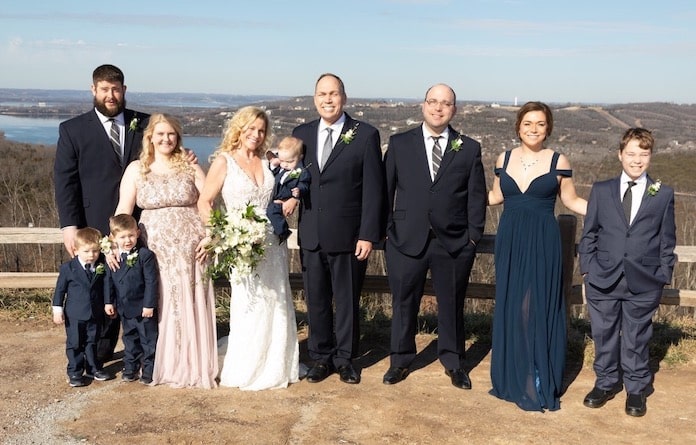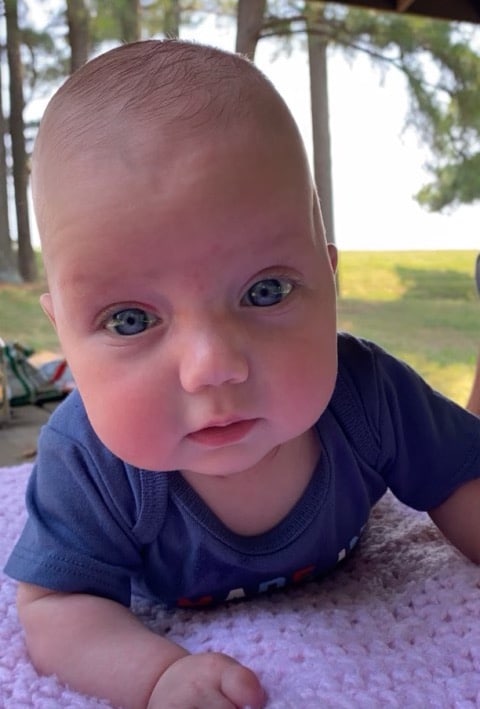Waterloo woman, 62, gives birth

As Kathy Blattner gazes into her 5-month-old’s big blue eyes, her face lights up just like any other mother.
Yet, the journey that led to this precious mother-daughter moment is what many would consider extraordinary.
At 62, Kathy is one of the oldest women in the U.S. to give birth.
The story began approximately 21 years ago, when she met her husband Dr. John Blattner. At that time, she was in her 40s and the couple knew from the beginning that they wanted children together. After years of trying to conceive with no success, she sought answers from fertility specialists and learned the eggs she had left could not support life.
Then, Dr. Anthony Pearlsone, a reproductive and infertility specialist, recommended egg donation. Doctors would then fertilize the eggs with her husband’s sperm, then transfer two embryos into Kathy’s uterus. This process is called in vitro fertilization.
Blattner said the idea of using eggs donated from another woman took some getting used to.
“I had to become grateful for egg donation instead of being devastated by it,” Kathy said. “I became grateful for it, and that’s when I changed my future. Gratitude changes everything, and here I am as happy as can be, living happily ever after.”
Kathy said it took her about a year to become on board with egg donation, but once she changed her mind set, it was time to look for a donor. Kathy knew she wanted a relative to donate the eggs, and still considers this essential today after having three children due to the process.
“I wanted it to be a genetic donation so it was still my family of genetics, which I think is very important,” Kathy explained. “I want to look at (my child) and see me.”
Her niece was her first egg donor, and this led to the Blattners’ 13-year-old son being born.
Eventually, the couple felt it was time to have more children when Kathy was in her 50s. The Blattners now faced yet another hurdle: the majority of the medical community ruled time was not on their side.
“It’s about my age,” Kathy said. “The guidelines rule me out because of my age, and I just think that’s so unfair.”
Such guidelines include those issued by the American Society for Reproductive Medicine, which state women over 55 pose a risk to their present and future health if they carry children.
Additionally, once women reach menopause, hormone replacement therapy is necessary for these mothers to be able to support the embryo. Kathy explained HRT not only built up the lining in her uterus so it could support the growing baby, but also is an essential part of supporting her body during the pregnancy.
Using HRT for such a prolonged time is also a point of contention among medical professionals. As Cleveland Clinic points out, both the American Heart Association and U.S. Food and Drug Administration’s guidelines state a woman’s risk of heart attack, stroke and breast cancer increase with long-term use.
This is why the Blattners say Dr. Sherman Silber is “courageous.” While no other doctor would prescribe Kathy the necessary high dose of HRT and help her get pregnant, he stepped up to the plate.
This provided Kathy with a different outlook on her body’s timetable.
“Women go through … a hormone loss, which is menopause,” Kathy began. “Your hormone loss, in medical terms, in the guidelines, is called ‘normal,’ but I call it deficiency, because your hormones support you. They support your skin, they support your heart, they support your organs, your eyes, every cell in your body, your estrogen and your progesterone (do). I find it a deficiency.”
Without Silber, the couple would not have their 2-year-old son and youngest daughter. Both were conceived from Kathy’s 31-year-old daughter from a previous relationship’s eggs.
Sarah, the egg donor, is not biologically related to Dr. Blattner.
At the time she gave birth to Sarah, Kathy said she would never have imagined she would need in vitro fertilization to have more children.
“I can remember being a really young person and hearing about ‘test tube babies’ on TV, and that’s basically what I did!” Kathy exclaimed. “I remember thinking ‘I’ll never need that,’ and here I am. We all go through a stage of believing we’re invincible … I was certainly that person.”
This is why Kathy encourages young women to store their eggs.
“You don’t know what life is going to throw at you,” Kathy said, later elaborating, “You may need them, you may not, but to need them and not have them is devastating. I was devastated when they told me I couldn’t have babies, as women are.”
The Blattners have encountered people who criticize her decision to grow her family at this stage in her life, but Kathy said this is nothing compared to the joy her family can bring to other women struggling with fertility.
“What I care about, and why I’m telling my story, is that lady in her living room who thinks that she doesn’t have hope,” Kathy said. “I was that lady, and I’m not that lady anymore. There are those women who are thinking that it’s hopeless and that they’re never going to have their babies. Obstacles are just obstacles made to be gotten around if you can, and I’m fortunate I was able to get around them.”
The couple still has one stored embryo. Kathy said while she does not know what the future holds, she finds peace knowing she has another chance to grow her family should she decide to.
“I don’t have that planned yet … we have a lot going on, but it’s there,” Blattner said, later adding, “It’s great to have the option. It cures your infertility. I feel cured. If I want a baby, I can. I’m not infertile anymore.”







